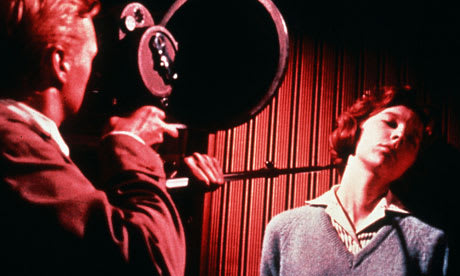Known well in the world of film theory and academia, Peeping Tom, Michael Powell's acutely self-aware ode to the voyeuristic and implicitly male eye of cinema, is still—more than fifty years after its release—a work that inspires discourse. Though dated, its hyper-realized assertion of repression as instigator of perversion and madness, as personified by the protagonist, Mark Lewis (Carl Boehm), a photographer and cameraman with a propensity for filming women as he kills them, can be seen as influencing many films and theorists challenging and examining the notion of perspective and passive viewership.
Acknowledging the overt metaphor of camera as ersatz penis—something evident when Mark responds excitedly to female terror by stroking his camera, at one point even kissing the lens provocatively—the opening sequence from Mark's perspective forces the audience into the role of active male engagement. In such, Mark's first-person eye while murdering a prostitute both adheres to the traditional punishment of female sexuality, while also questioning, or attacking, the perverse need to watch and engage vicariously.
As the film progresses and the plot follows Mark's tenuous, clumsy attempts at traditional romance, dating a young woman that lives downstairs in his building, the scopophilic template mirrors an inability to fulfill a male role, suggesting that spectatorship and desire stems from the inability to obtain or possess, which loops back to the topic of repression. Consistently, his girlfriend Helen (Anna Massey) is the instigator of romantic endeavours in a traditionalist sense, which is juxtaposed with Mark's hidden sense of assertiveness, which comes out only when he's behind his camera, murdering a woman that he is forcing to witness and embrace her own fear and passivity by putting a mirror on the front of his camera.
The most observant and distressing critique of this horrific concept—a concept that forces the male eye onto a woman being punished for finding enjoyment in being a passive object for a camera (or penis)—is possibly Kathryn Bigelow's Strange Days, which takes the concept of prurient voyeurism a step further by assessing the sense of entitlement men have while watching. Other films have similarly referenced Peeping Tom to lesser success (Sliver, Exotica or anything from Brian De Palma) but haven't been quite as successful as Bigelow in removing the desire to watch from a criticism or analysis of the subject.
In such, stepping back to re-evaluate and appreciate this grandfather of theoretically deconstructing scopophilia, is in itself quite intriguing. Despite a limited ability to assess gender with a great deal of balance—it was 1960, after all—Powell's disturbing work of passive psychological horror raises an abundance of questions that don't have easy answers, making it a timeless work of cultural importance.
Peeping Tom screens on November 4th @ 7:30pm at the TIFF Bell Lightbox and will be introduced by George A. Romero.
(Fox)Acknowledging the overt metaphor of camera as ersatz penis—something evident when Mark responds excitedly to female terror by stroking his camera, at one point even kissing the lens provocatively—the opening sequence from Mark's perspective forces the audience into the role of active male engagement. In such, Mark's first-person eye while murdering a prostitute both adheres to the traditional punishment of female sexuality, while also questioning, or attacking, the perverse need to watch and engage vicariously.
As the film progresses and the plot follows Mark's tenuous, clumsy attempts at traditional romance, dating a young woman that lives downstairs in his building, the scopophilic template mirrors an inability to fulfill a male role, suggesting that spectatorship and desire stems from the inability to obtain or possess, which loops back to the topic of repression. Consistently, his girlfriend Helen (Anna Massey) is the instigator of romantic endeavours in a traditionalist sense, which is juxtaposed with Mark's hidden sense of assertiveness, which comes out only when he's behind his camera, murdering a woman that he is forcing to witness and embrace her own fear and passivity by putting a mirror on the front of his camera.
The most observant and distressing critique of this horrific concept—a concept that forces the male eye onto a woman being punished for finding enjoyment in being a passive object for a camera (or penis)—is possibly Kathryn Bigelow's Strange Days, which takes the concept of prurient voyeurism a step further by assessing the sense of entitlement men have while watching. Other films have similarly referenced Peeping Tom to lesser success (Sliver, Exotica or anything from Brian De Palma) but haven't been quite as successful as Bigelow in removing the desire to watch from a criticism or analysis of the subject.
In such, stepping back to re-evaluate and appreciate this grandfather of theoretically deconstructing scopophilia, is in itself quite intriguing. Despite a limited ability to assess gender with a great deal of balance—it was 1960, after all—Powell's disturbing work of passive psychological horror raises an abundance of questions that don't have easy answers, making it a timeless work of cultural importance.
Peeping Tom screens on November 4th @ 7:30pm at the TIFF Bell Lightbox and will be introduced by George A. Romero.
